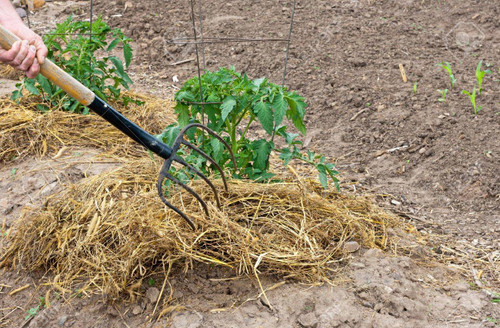Mulching Tomatoes
Posted by Eli on 12th Aug 2019
Mulch is simply a covering over the soil that keeps moisture in, blocks weeds and protects low-growing tomatoes from resting on the ground and developing rot. There's some extra benefit to using organic mulches such as grass clippings, hay, leaves or sawdust because these materials -- unlike plastic, aluminum or other synthetic mulches -- decompose, providing food for the millions of microorganisms that live in the soil, making nutrients available to your plants and improving soil structure.
What Mulches Do:
Mulches can raise or lower soil temperature, too. In the North, sheets of thin black plastic are often put down at planting time to warm up the soil, so that heat-loving tomatoes can get off to a good start. As soon as the sun starts hitting that plastic in the morning, the plant roots receive extra heat. Keep in mind that only those countries that have frosty temperatures need to warm up the soil prior planting. Tropical countries contains warm soil temperatures year round and do not need extra heating prior starting the seeds.
If you use a woody material, such as bark, fresh sawdust or wood chips as a mulch, it's a good idea to add some extra nitrogen fertilizer to the soil. Otherwise the soil microorganisms, which need nitrogen for their own growth, will temporarily tie up the nitrogen your plants need until the mulch is broken down. Adding extra fertilizer supplies enough nitrogen for both plants and microorganisms.
In the South and Southwest, gardeners often use thick mulches of hay, straw or pine needles to protect tomato roots from too much heat during the hot summer months, as well as to help retain moisture in the soil. Some gardeners also pile up soil five or six inches around the stems of their plants to insulate the roots more and promote some extra growth. This technique is called "hilling."
Using black plastic as mulch is good in the South and Southwest only early in the season when the plants appreciate a little extra heat. If used in summer months, however, the roots would literally cook. If you use black plastic, you can cover it with a heavy organic mulch that will keep soil temperature down when the weather heats up.
Some gardeners in hot areas use a commercially available mulch with an aluminum foil surface that reflects the sun and keeps the soil cool. Of course, it also keeps weeds down and conserves soil moisture.
Mulching Pointers
Many people make a big mistake by putting heavy organic mulches around their tomatoes too early in the season. Wait four or five weeks until the ground has really warmed up -- especially in the North. With hay or any heavy mulch you're insulating the soil, so using it early in the season keeps the soil cool, and that's no good. You delay the harvest a few weeks if you do this.
If you're going to use black plastic, put it down at planting time when the soil is moist. (The three-foot-wide plastic is probably best.) Secure it firmly around all the edges. The better contact the plastic makes with the soil, the more heat and moisture you trap. Then, to put in a transplant, simply punch or cut a hole or a slit in the plastic. Additional small holes here and there to let rainwater soak through are a good idea, too.
Staked and trellised plants usually benefit from a mulch to save moisture. More exposed to sun and wind than unstaked plants, they lose more water through their leaves. It takes extra effort to provide them with an ample and even supply of moisture, but in dry climates, it's worth it.
Weeds
Weeds are usually no problem around tomatoes in the home garden. As the plants are starting to grow, they are far enough apart for you to get close to do any weeding necessary. If you let some plants grow freely, you'll soon see that, with their dense foliage, they shade out weeds very well and smother them. A good mulch around staked or trellised plants will keep down weeds, so they won't rob the plants of water and nutrients.
If you have any questions in regards to mulching your tomato plants, please feel free to contact us at admin@theseedsmaster.com or directly through our FB page.


